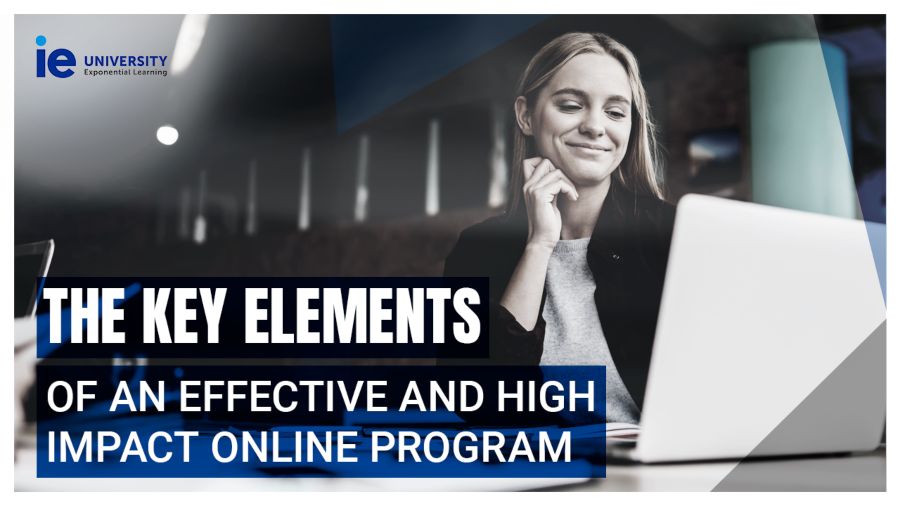What are the Key Elements of an effective High Impact Online Program?

Online education has been evolving over the last few decades, and has now come to be associated with high quality, great results and effectiveness. It’s commonplace for people to take a wide range of courses online: from short, self-paced courses and MOOCs, to interactive executive education and master’s programs.
Online education or online courses can include a broad spectrum of learning opportunities, many of which are fantastic in their own right. However, in this case, we will focus specifically on Executive Education Online Programs. These types of courses normally feature a single cohort in each intake and typically last between four and 12 weeks.
They are characteristically offered in a flexible format, which allows participants to balance their personal and professional lives. Due to this flexible approach, they are becoming very popular as professionals, middle managers and executives have to continuously acquire new skills and remain up to date in order to stay relevant.
This leads us onto the question:
How can learners identify online programs that are well designed, effective and sure to have a real impact on their professional careers?
In this blog post, I will share some ideas that will help you identify online programs that have a high impact.
1. Effective
As a premise, this includes a number of elements which need to be taken into account. Participants will invariably invest time in any HIOP course, and this invested time should be considered as an important and scarce resource.
The learning objectives must be made clear when designing the course. In addition, every activity in both asynchronous and synchronous formats should add value and be relevant to help achieve the learning goals.
Furthermore, these courses have to rely on learning analytics as one of the ways to measure effectiveness in terms of skills and knowledge acquired, as well as the mastery of concepts.
2. Engaging and social
In general, learning is a process that requires the student’s attention. However, for these particular programs, a student’s intention is also crucial. Motivation is an important factor when deciding to enroll on an online program. Nonetheless, even if the learner is very motivated, if the course is not engaging, the results will not be positive. This means that it is imperative that the course is engaging, fun, interesting and appealing—in short, it should be interactive.
When we say an online program should be interactive, we should consider interaction not only in terms of the learners and the faculty, but also between the learners themselves, as it increases the quality of the learning and promotes networking. Furthermore, we should consider the interaction between the participant and the platform or systems through which the program is being carried out.
3. Include a mix of learning resources and formats
There should be a variety of learning resources and experiences available. Here are some examples:
- Different learning activities – This is crucial from a pedagogical point of view, but it is also important from the perspective of engagement. Having different activities and exercises will give the course some variety, avoiding monotony and increasing both interest and engagement. Furthermore, this practice supports more learning styles while providing increased stimuli that help reinforce retention.
- Videos – It is almost certain that those enrolled on the course will be interested in the topic. Even so, we have to ensure that the videos are well prepared, that speakers share ideas that are relevant and that videos include different visuals which support retention and attention. We should also include analogies as well as applied concepts when explaining such ideas, and we should have guest speakers who share their vision and complement the faculty. In addition, it is good practice to include questions within the videos, which learners can answer right away or use to discuss topics further.
4. Real interaction with faculty
Live and real interaction can be achieved in many ways and there are several options to realize this:
- Live and interactive sessions – This is prime time during the course, as participants can directly interact with the faculty. It is crucial that professors prepare the class whilst considering the course profile and interest. The professors should also consider how the course has been evolving in the days or weeks before the videoconference. Rather than lecturing, the faculty member should foster discussion, interaction, debate, practice and analysis.
- Learning or tutoring sessions – As the online program will include assignments, activities and projects, participants should have some time available for the faculty team to answer questions or guide them through the assessments.
- Forums – Discussions, Q&A, debates, learning support; all this and much more can be achieved with the use of a live and engaging forum or short videoconferences.
- Feedback – This is essential to round-up the learning process. Feedback can come from the faculty team which is involved in the course design and delivery, but it can also come from peers. On some occasions, we can have automated feedback, so that participants get instant feedback when required.
5. Applied
Application of concepts is key in a High Impact Online Program. Why? This is because professionals, middle managers and executives take these programs in order to apply the concepts they learn to their jobs, something that represents a challenge for the learning design team. The majority of the course should be very practical and hands on, rather than theoretical.
The online program has to include a number of activities for participants to do exercises but it must also go beyond that. It is key to design activities that require analysis in order to develop judgment skills, as well as new mindsets.
Every module can have formative and summative assessments or exercises. The idea behind this is that participants put their knowledge into practice and are able to do different things with it.
6. Personalized
The concept of personalization is huge and every participant will have different needs and a different learning style. If the course has been designed with this in mind from the very beginning, a good level of personalization can be achieved.
Another element to consider is that programs should include both human interaction and either the support of learning analytics or machine learning models.
In this way, every participant has the opportunity to be understood and can receive the attention they need when required.
7. Supportive
With this point, I am not just referring to academic support or the “real interaction with faculty” already mentioned above. Instead, I’d like to highlight the importance of a team devoted to logistics, and program and platform management.
This team will accompany participants on a daily basis, making sure that everyone is keeping up with the expected program rhythm and getting the most out of the experience without falling behind.
Furthermore, with online programs, we have to use and rely on technology. Any technology used has to be user-friendly, since participants do not have time to waste.
8. Continuous enhancement
This is a motto I truly believe in. Even if the online program has been taught on numerous occasions, each new intake is another opportunity to enhance the course. It is also an opportunity to update the content, activities and platform.
In addition, things learned from previous intakes should be applied. Feedback from learners and learning analytics should also be considered in order to enhance the course. There should be continuous reviews as part of the quality checks.
A great online program is one that is designed to be, and is seen as, a truly effective learning experience. If you are interested in learning more about our online executive education programs at IE Business School, please visit https://www.ie.edu/exponential-learning/high-impact-online-programs/ or contact me.
Author
Martín Rodríguez
Mobile number: +34 690 39 28 22
Director of IE Publishing & Executive Education Online
IE University



